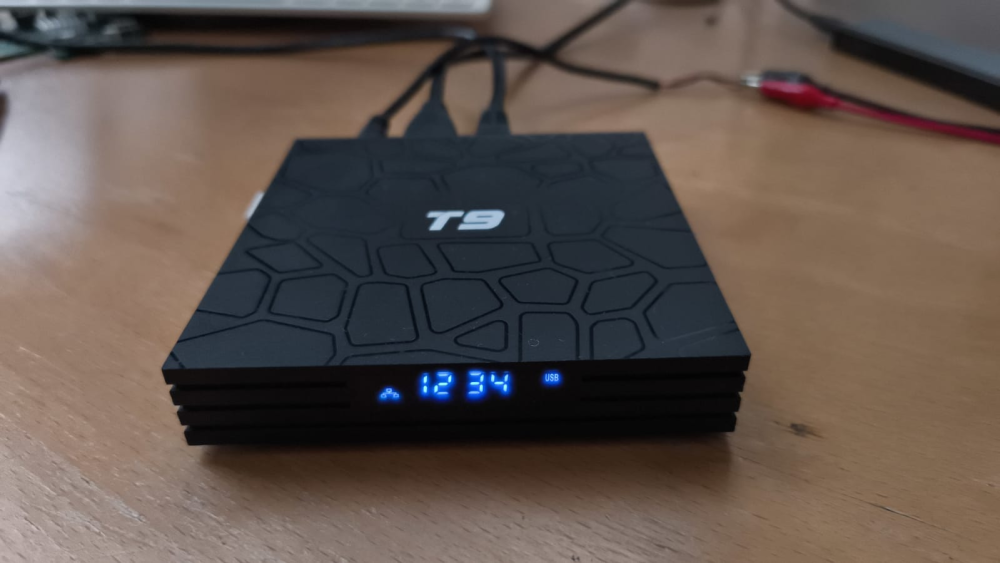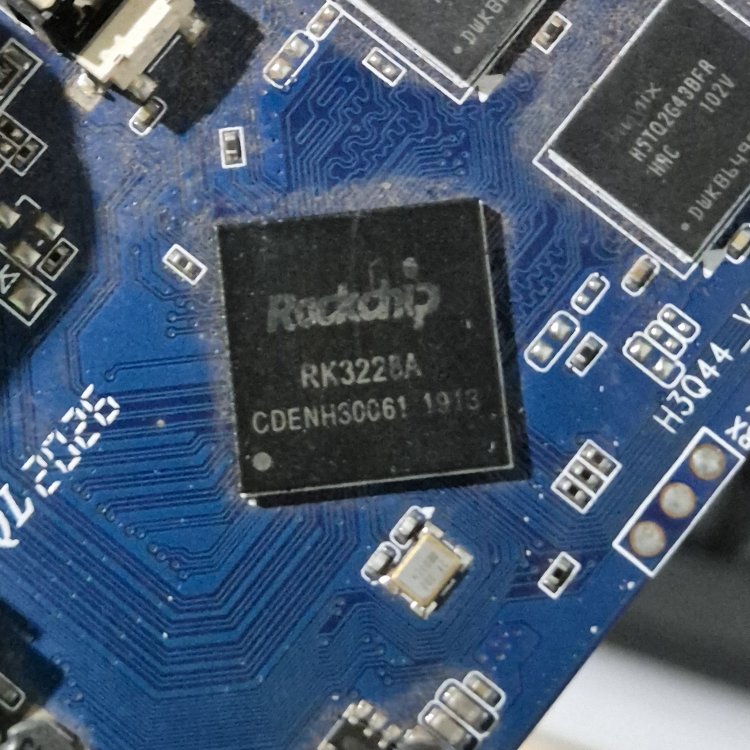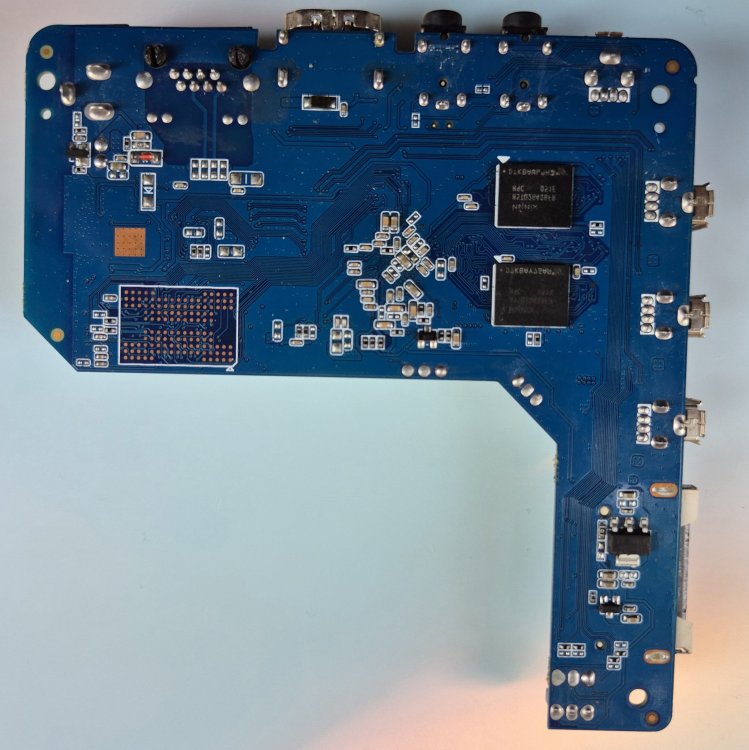All Activity
- Today
-
I received a Helios4 and was finally able to get it to boot. As per instructions, I booted from microSD and flashed the latest Armbian image to sda1 via the nand-sata-install command. This reboots fine now, but only with the microSD-card present and the SW1 dipswitch set to "SD card boot mode". Is anybody here using "SPI NOR Flash" or "SATA1" boot mode to get rid of the microSD card? I am bit handicapped here since my serial port on the microUSB only comes up maybe 1 in 10 times. I wonder if it's worn out or if I am simply doing something wrong. Related Links: 1 2 3
-
@jock Does it make a diference witch multitool trusted OS i use?
-
I'm looking for Orange Pi RV2 RISC-V support. This board is gaining popularity due to the Orange Pi manufacturer's good reputation with Arm. I have successfully built both Orange Pi and Raspberry Pi aarch64 builds on Debian from source so I'd like to know how to build Armbian for Orange Pi RV2 riscv64. What would I need to modify in the build process? Thanks!!
-
Update: It works now, however the power LED doesn't seem to light up, but the video card is detected in /dev
-
Okay I found out that the previous error was mainly user error, due to an invalid user_overlays=, however I am facing a new issue and it still doesn't seem to work This is the new error Boot script loaded from mmc 1:1 308 bytes read in 2 ms (150.4 KiB/s) 14207910 bytes read in 1182 ms (11.5 MiB/s) 48779776 bytes read in 4043 ms (11.5 MiB/s) 161122 bytes read in 26 ms (5.9 MiB/s) Working FDT set to a100000 3772 bytes read in 4 ms (920.9 KiB/s) Applying user provided DT overlay radxa-zer5028 bytes read in 8 ms (613.3 KiB/s) Applying user provided DT overlay radxa-zero3-tc358743-audio.dtbo Trying kaslrseed command... Info: Unknown command can be safely ignored since ot apply to all boards. Unknown command 'kaslrseed' - try 'help' Moving Image from 0x2080000 to 0x220## Loading init Ramdisk from Legacy Image at 0a200000 ... Imagpe: AArch64 Linux RAMDisk Image (gzip compressed) Data Size: 14207846 Bytes = 13.5 MiB Loadoint: 00000000 Verifying Checksum ... OK ## Flattened Device Tree blob at 0a100000 Booting using the fdt blob at 0xa100000 Working FDT set Loading Ramdisk to 7c133000, end 7cebfb66 ... OK I'm not sure why it is saying it is loading radxa-zer5028 when that is clearly not what is listed in armbianEnv.txt This is what is in armbianEnv user_overlays=radxa-zero3-tc358743 radxa-zero3-tc358743-audio
-
After checking uboot logs, it shows that it fails to load the dtbo files, although I'm not sure what the error is. ** Booting bootflow 'mmc@fe2b0000.bootdev.part_1' with script Boot script loaded from mmc 1:1 308 bytes read in 2 ms (150.4 KiB/s) 14207910 bytes read in 1182 ms (11.5 MiB/s) 48779776 bytes read in 4043 ms (11.5 MiB/s) 161122 bytes read in 26 ms (5.9 MiB/s) Working FDT set to a100000 Failed to load '/overlay-user/radxa-zero3-tc358743,radxa-zero3-tc358743-audio.dtbo' Trying kaslrseed command... Info: Unknown command can be safely ignored sincelrseed does not apply to all boards. Unknown command 'kaslrseed' - try 'help' Moving Image from 0x20840000 ## Loading init Ramdisk from Legacy Image at 0a200000 ... Image : AArch64 Linux RAMDisk Image (gzip compressed) Data Size: 14207846 Bytes = 13.5 MiB Load Address: 00000int: 00000000 Verifying Checksum ... OK ## Flattened Device Tree blob at 0a100000 Booting using the fdt blob at 0xa100000 Working FDT set to a100000 Loading Ramdisk to 7c133000, end 7cebfb66 ... OK ERROR: reserving fdt memory region failed (addr=0 size=0 flags=0) ERROR: reserving fdt memory region failed (addr=0 size=0 flags=0) Loading Device Tree to 000000007c0a3000, end 000000007c132fff .OK Working FDT set to 7c0a3000
-

Wyse 3040 (N10D) can't boot UEFI USB image ?
Sonikku replied to MarkA007's topic in UEFI x86 / qemu x86 / arm64
I have managed to successfully install Armbian onto the DELL Wyse3040 As mentioned above, the way to do this is to use a PE environment that works on these devices. I used an old version of Hiren's BootCD and booted from it. Then I used a NTFS formatted flash drive with the unzipped image and used Roadkill's Disk Image to write it to the eMMC And it works, beautifully -
Mmmh, the easiest thing you can do you can build an armbian image taking rk322x_tee_os.bin from this branch in my repo and overwrite rk322x_tee.bin in the same path of your armbian copy, then build a regular image which will have an opensource TEE and should have no issues anymore. Actually you could even reinstall u-boot without reinstalling the whole system, but it is just a tiny bit more involved. If you can restart from scratch, rebuilding the image with opensource TEE is easier.
-
sorry for my confusion @jock im kinda new to this. yeah it switched from a 1mim watchdog to a 30mim watchdog crash. Is there a armbian distro that will work, what should i do here?
-

Help wanted to test a new OpenVFD alternative
GmP replied to Jean-Francois Lessard's topic in Amlogic meson
Hi - thank you for the nice driver. Here is my contrbute: Device under test : T9_RK3318 (T9 Sunwell 3318 version 4+32 GB) Running: v25.11 rolling for RK3318 Box running Armbian Linux 6.12.55-current-rockchip64 Packages: Debian stable (trixie) Support: for advanced users (rolling release) Some info: RK3318:~# lsmod | grep tm tm16xx 28672 0 stmmac_platform 20480 1 dwmac_rk stmmac 241664 3 stmmac_platform,dwmac_rk pcs_xpcs 28672 1 stmmac lsmod | grep i2c i2c_gpio 16384 0 i2c_algo_bit 12288 1 i2c_gpio ls /sys/bus/i2c/devices/ 5-0024 i2c-4 i2c-5 ls /sys/class/leds/display brightness device digits map_seg7 max_brightness num_digits num_segments power segments subsystem trigger uevent value ls -l /sys/class/leds/ total 0 lrwxrwxrwx 1 root root 0 Oct 26 11:53 display -> ../../devices/platform/i2c-display/i2c-5/5-0024/leds/display lrwxrwxrwx 1 root root 0 Oct 26 11:53 display::alarm -> ../../devices/platform/i2c-display/i2c-5/5-0024/leds/display::alarm lrwxrwxrwx 1 root root 0 Oct 26 11:53 display::colon -> ../../devices/platform/i2c-display/i2c-5/5-0024/leds/display::colon lrwxrwxrwx 1 root root 0 Oct 26 11:53 display::lan -> ../../devices/platform/i2c-display/i2c-5/5-0024/leds/display::lan lrwxrwxrwx 1 root root 0 Oct 26 11:53 display::pause -> ../../devices/platform/i2c-display/i2c-5/5-0024/leds/display::pause lrwxrwxrwx 1 root root 0 Oct 26 11:53 display::play -> ../../devices/platform/i2c-display/i2c-5/5-0024/leds/display::play lrwxrwxrwx 1 root root 0 Oct 26 11:53 display::usb -> ../../devices/platform/i2c-display/i2c-5/5-0024/leds/display::usb lrwxrwxrwx 1 root root 0 Oct 26 11:53 display::wlan -> ../../devices/platform/i2c-display/i2c-5/5-0024/leds/display::wlan lrwxrwxrwx 1 root root 0 Jan 1 1970 input3::capslock -> ../../devices/platform/ff600000.usb/xhci-hcd.0.auto/usb2/2-1/2-1:1.1/0003:248A:8208.0002/input/input3/input3::capslock lrwxrwxrwx 1 root root 0 Jan 1 1970 input3::compose -> ../../devices/platform/ff600000.usb/xhci-hcd.0.auto/usb2/2-1/2-1:1.1/0003:248A:8208.0002/input/input3/input3::compose lrwxrwxrwx 1 root root 0 Jan 1 1970 input3::kana -> ../../devices/platform/ff600000.usb/xhci-hcd.0.auto/usb2/2-1/2-1:1.1/0003:248A:8208.0002/input/input3/input3::kana lrwxrwxrwx 1 root root 0 Jan 1 1970 input3::numlock -> ../../devices/platform/ff600000.usb/xhci-hcd.0.auto/usb2/2-1/2-1:1.1/0003:248A:8208.0002/input/input3/input3::numlock lrwxrwxrwx 1 root root 0 Jan 1 1970 input3::scrolllock -> ../../devices/platform/ff600000.usb/xhci-hcd.0.auto/usb2/2-1/2-1:1.1/0003:248A:8208.0002/input/input3/input3::scrolllock lrwxrwxrwx 1 root root 0 Jan 1 1970 working -> ../../devices/platform/gpio-leds/leds/working Testing... echo "1234" > /sys/class/leds/display/value echo 1 > /sys/class/leds/display\:\:lan/brightness echo 1 > /sys/class/leds/display\:\:usb/brightness All the 7 functions and 4 digits are working and correctly associated. Also trigges are working. I still have this small bug which is stopping rolling messages: display-service -c [INFO] all digits and leds on /usr/sbin/display-service: 116: cannot create /sys/class/leds/display/message: Permission denied All the function leds reacts well (all on) but the four clock digits do not switch, most likey because of the message permission denied. However they do work writing directly in the "value" as above and in the picture. Attached the working dtso file. rk3318-t9.dtso -
Multitool uses the proprietary miniloader blob for booting and it does not work with opensource OPTEE unfortunately. I guess the issue is related with this patch that allows mainline opensource u-boot to support proprietary Trust OS, but that's just an ineducated guess.
-
@jock do you have this OPTEE already builded for sharing? The one in your multitool git did not work for me, also it shows the last change was 2 years ago hahahha.
-
Hello @Victor Picinin yes the problem is exactly a watchdog in the proprietary trust os. Some people have issues after 60 seconds, others after 30 seconds and others after 30 minutes. Being the proprietary Trust OS closed source, we can't know what is happening. I suspect it is a sort of automatic "suspend" feature of some sort, but can't be sure because digging into practically is diffucult. What is sure is that if we use OPTEE Trust OS compiled from open sources (OPTEE is the base for the proprietary Trust OS too), there are no issues of sort, but we lose some features like DDR3 memory scaling and "virtual power off" (a suspend mode that can awaken the board via IR-control; there is a driver and a device tree overlay for that to work in armbian)
-
@Victor Picinin Hello Victor thank you for your work. Also @jock and @ilmich managed to obtain free source trust and not the proprietary One but i rembember there were issues ( DMC scaling on DDR3 ??? ) Sure jock or ilmich can answer better
-
This was a watchdog and trust os issue. For anyone having this issue, i fixed by building a new multitool from OP github: https://github.com/paolosabatino/multitool/tree/master Changing the RK322x TRUST_OS to: rk322x_tee_1.0.1-72-gf230aa2.bin And them building a new armbian build replacing the armbian TRUST_OS with this same one. "rk322x_tee_1.0.1-72-gf230aa2.bin" if anyone needs the builded files "multitool and armbian" feel free to email me at vitorpicinin@gmail.com
-
I wasn't talking about dmesg logs.
-
Yes. I check the dmesg logs and they aren't loading which is probably why it doesn't work, but I have tried a variety of methods to try and get them to load, however nothing worked.
-
Did you make sure they're actually loaded? Like by checking uboot boot logs via serial console?
-
Would you mind sharing the steps you took to enable csi camera support? I'm trying to enabled the CSI port on the Radxa Zero 3W for the TC358743, but I have been unable to make progress. I'm currently using a Geekom X1301 HAT for the CSI to HDMI adapter which uses the TC358743, but it never shows up. What I have tried so far is extracting the .dtbo files from the official radxa image. Adding them to /boot/overlay-user and enabling the two tc358743 overlays radxa-zero3-tc358743.dtbo radxa-zero3-tc358743-audio.dtbo and finally enabling them in armbianEnv.txt with this line user_overlays=radxa-zero3-tc358743,radxa-zero3-tc358743-audio Is there anything that I missed? The CSI port still doesn't seem to be receiving any power, as the X1301's power LED has been off the whole time.
- Yesterday
-
@Mateus Lima It Is not the first neither will be the last time that china manufacturers fake soc printing. Have a look on allwinner forum
-
It appears that the system control was not configured properly. In the default DTS the binding is "sun8i-a83t-system-controller" which appears to have been deprecated in favor of the suffix "system-control" from what I could find. So tested with "sun8i-a83t-system-control" and "sun8-h3-system-control" as a fall back option. This time we no complaints from Cedrus: ryzer@cubietruckplus:~$ sudo dmesg | grep cedrus [ 10.624985] sunxi_cedrus: module is from the staging directory, the quality is unknown, you have been warned. [ 10.652836] cedrus 1c0e000.video-codec: Device registered as /dev/video0 Second test was to ensure that the video-engine clocks are set correctly, which can be done by temporarily disabling driver suspension. ryzer@cubietruckplus:/sys/kernel$ sudo cat debug/clk/bus-ve/clk_enable_count 1 ryzer@cubietruckplus:/sys/kernel$ sudo cat debug/clk/ve/clk_enable_count 1 ryzer@cubietruckplus:/sys/kernel$ sudo cat debug/clk/dram-ve/clk_enable_count 1 Next test trying to get working which should be using the version of ffmpeg as detailed here: This is the current output of ffmpeg: ffmpeg version 5.1.7-0+deb12u1 Copyright (c) 2000-2025 the FFmpeg developers built with gcc 12 (Debian 12.2.0-14) configuration: --prefix=/usr --extra-version=0+deb12u1 --toolchain=hardened --libdir=/usr/lib/arm-linux-gnueabihf --incdir=/usr/include/arm-linux-gnueabihf --arch=arm --enable-gpl --disable-stripping --enable-gnutls --enable-ladspa --enable-libaom --enable-libass --enable-libbluray --enable-libbs2b --enable-libcaca --enable-libcdio --enable-libcodec2 --enable-libdav1d --enable-libflite --enable-libfontconfig --enable-libfreetype --enable-libfribidi --enable-libglslang --enable-libgme --enable-libgsm --enable-libjack --enable-libmp3lame --enable-libmysofa --enable-libopenjpeg --enable-libopenmpt --enable-libopus --enable-libpulse --enable-librabbitmq --enable-librist --enable-librubberband --enable-libshine --enable-libsnappy --enable-libsoxr --enable-libspeex --enable-libsrt --enable-libssh --enable-libsvtav1 --enable-libtheora --enable-libtwolame --enable-libv4l2 --enable-v4l2-request --enable-v4l2-m2m --enable-libvidstab --enable-libvorbis --enable-libvpx --enable-libwebp --enable-libudev --enable-libx265 --enable-libxml2 --enable-libxvid --enable-libzimg --enable-libzmq --enable-libzvbi --enable-lv2 --enable-omx --enable-openal --enable-opencl --enable-opengl --enable-sdl2 --disable-sndio --enable-libjxl --enable-pocketsphinx --enable-librsvg --enable-libdc1394 --enable-libdrm --enable-libiec61883 --enable-chromaprint --enable-frei0r --enable-libx264 --enable-libplacebo --enable-librav1e --enable-shared libavutil 57. 28.100 / 57. 28.100 libavcodec 59. 37.100 / 59. 37.100 libavformat 59. 27.100 / 59. 27.100 libavdevice 59. 7.100 / 59. 7.100 libavfilter 8. 44.100 / 8. 44.100 libswscale 6. 7.100 / 6. 7.100 libswresample 4. 7.100 / 4. 7.100 libpostproc 56. 6.100 / 56. 6.100 Hardware acceleration methods: vdpau vaapi drm opencl vulkan It is also worth mention that as there is no support for the SGX544 GPU, we are limited to a CLI only interface for which MPV can only be launched full-screen. MPV fails to use hardware decoding and falls back to using software. MPV version is reported as 0.35.1 [ 3.639][v][vo/gpu-next/opengl] Initializing GPU context 'drm' [ 3.643][e][vo/gpu-next] Can't handle VT release - signal already used [ 3.647][w][vo/gpu-next/opengl] Failed to set up VT switcher. Terminal switching will be unavailable. [ 3.651][v][vo/gpu-next/opengl] Initializing KMS [ 3.657][v][vo/gpu-next/opengl] Picked DRM card 0, primary node /dev/dri/card0 as the default. [ 3.662][v][vo/gpu-next/opengl] Driver: sun4i-drm 1.0.0 (0) [ 3.666][v][vo/gpu-next/opengl/kms] Connector 63 currently connected to encoder 62 [ 3.670][v][vo/gpu-next/opengl/kms] Selected Encoder 62 with CRTC 61 [ 3.675][v][vo/gpu-next/opengl/kms] Selected mode: 1920x1200 (1920x1200@60.00Hz) [ 3.679][v][vo/gpu-next/opengl] DRM Atomic support found [ 3.684][v][vo/gpu-next/opengl/kms] Using overlay plane 51 as draw plane [ 3.689][v][vo/gpu-next/opengl/kms] Using primary plane 57 as drmprime plane [ 3.693][v][vo/gpu-next] GBM_FORMAT_ARGB8888 not supported by draw plane: Falling back to GBM_FORMAT_XRGB8888. [ 3.697][v][vo/gpu-next] Supported modifier: 0x0 [ 3.702][v][vo/gpu-next] Creating GBM device [ 4.915][v][vo/gpu-next] Initializing GBM surface (1920 x 1200) [ 4.920][e][vo/gpu-next] Failed to create GBM surface. [ 4.924][e][vo/gpu-next] Failed to setup GBM. [ 5.397][v][vd] Container reported FPS: 30.000000 [ 5.405][v][vd] Codec list: [ 5.409][v][vd] h264 - H.264 / AVC / MPEG-4 AVC / MPEG-4 part 10 [ 5.414][v][vd] h264_v4l2m2m (h264) - V4L2 mem2mem H.264 decoder wrapper [ 5.418][v][vd] Opening decoder h264 [ 5.424][v][vd] Looking at hwdec h264-drm... [ 5.428][v][vd] Could not create device. [ 5.433][v][vd] No hardware decoding available for this codec. [ 5.437][v][vd] Using software decoding. [ 5.445][v][vd] Detected 8 logical cores.
-
Well, it seems that I have a very strange device, as I can boot armbian for devices using Allwinner H3, even tho the SoC shows It self as a RK322BA. I don't know what's happening with my device, and unfortunately, there's no much information about it, just some users trying random armbian builds from devices with the same soc, which works, but features like wi-fi doesn't, probably something that can be fixed making a dtb for this device, which I don't know how to unfortunately.
-
@Mateus Lima I am not very sure this Is a rockchip board.. i see h3q ...may be an allwinner h3 ?????? Can you check removing the heatsink ? Or check with USB ttl adapter ?
-








.thumb.jpg.446c05097c3aa05ea89789c86b21195c.jpg)
